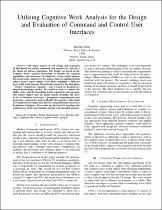 ResearchSpace
ResearchSpace
Utilising cognitive work analysis for the design and evaluation of command and control user interfaces
JavaScript is disabled for your browser. Some features of this site may not work without it.
- ResearchSpace
- →
- Research Publications/Outputs
- →
- Conference Publications
- →
- View Item
| dc.contributor.author |
Gous, E

|
|
| dc.date.accessioned | 2014-05-22T11:46:42Z | |
| dc.date.available | 2014-05-22T11:46:42Z | |
| dc.date.issued | 2013-11 | |
| dc.identifier.citation | Gous, E. 2013. Utilising cognitive work analysis for the design and evaluation of command and control user interfaces. In: International Conference on Adaptive Science and Technology (ICAST), Pretoria, South Africa, 25-27 November 2013 | en_US |
| dc.identifier.uri | http://ieeexplore.ieee.org/stamp/stamp.jsp?tp=&arnumber=6707495 | |
| dc.identifier.uri | http://hdl.handle.net/10204/7423 | |
| dc.description | International Conference on Adaptive Science and Technology (ICAST), Pretoria, South Africa, 25-27 November 2013. Post print attached. | en_US |
| dc.description.abstract | This paper reports on the design and evaluation of distributed net-centric command and control user interfaces for future air defence operations. The design was based on the Cognitive Work Analysis framework to identify the required capabilities and constraints in which the system would operate. The framework comprises of five phases that are populated using subject matter expert inputs. Each phase highlights a different facet of the work domain. Of particular interest is the final phase - Worker Competency Analysis - that is based on Rasmussen’s human performance model. The model is used to capture the skills-, rules- and the knowledge-levels required by the operator. The author suggest that the model closely resembles the three levels of Situation Awareness - perception, comprehension and projection - and can be used to identify the measures with which to evaluate the developed user interface using Situation Awareness Evaluation techniques. The results are then used to scrutinise the conformance of the user interface design to its intended purpose. | en_US |
| dc.language.iso | en | en_US |
| dc.publisher | IEEE Xplore | en_US |
| dc.relation.ispartofseries | Workflow;12533 | |
| dc.subject | Cognitive system engineering | en_US |
| dc.subject | User interface design | en_US |
| dc.subject | Command and control | en_US |
| dc.subject | Cognitive work analysis | en_US |
| dc.title | Utilising cognitive work analysis for the design and evaluation of command and control user interfaces | en_US |
| dc.type | Conference Presentation | en_US |
| dc.identifier.apacitation | Gous, E. (2013). Utilising cognitive work analysis for the design and evaluation of command and control user interfaces. IEEE Xplore. http://hdl.handle.net/10204/7423 | en_ZA |
| dc.identifier.chicagocitation | Gous, E. "Utilising cognitive work analysis for the design and evaluation of command and control user interfaces." (2013): http://hdl.handle.net/10204/7423 | en_ZA |
| dc.identifier.vancouvercitation | Gous E, Utilising cognitive work analysis for the design and evaluation of command and control user interfaces; IEEE Xplore; 2013. http://hdl.handle.net/10204/7423 . | en_ZA |
| dc.identifier.ris | TY - Conference Presentation AU - Gous, E AB - This paper reports on the design and evaluation of distributed net-centric command and control user interfaces for future air defence operations. The design was based on the Cognitive Work Analysis framework to identify the required capabilities and constraints in which the system would operate. The framework comprises of five phases that are populated using subject matter expert inputs. Each phase highlights a different facet of the work domain. Of particular interest is the final phase - Worker Competency Analysis - that is based on Rasmussen’s human performance model. The model is used to capture the skills-, rules- and the knowledge-levels required by the operator. The author suggest that the model closely resembles the three levels of Situation Awareness - perception, comprehension and projection - and can be used to identify the measures with which to evaluate the developed user interface using Situation Awareness Evaluation techniques. The results are then used to scrutinise the conformance of the user interface design to its intended purpose. DA - 2013-11 DB - ResearchSpace DP - CSIR KW - Cognitive system engineering KW - User interface design KW - Command and control KW - Cognitive work analysis LK - https://researchspace.csir.co.za PY - 2013 T1 - Utilising cognitive work analysis for the design and evaluation of command and control user interfaces TI - Utilising cognitive work analysis for the design and evaluation of command and control user interfaces UR - http://hdl.handle.net/10204/7423 ER - | en_ZA |





